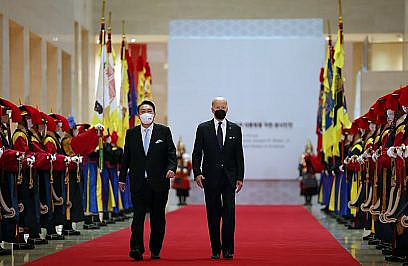The U.S. has announced a series of new actions in recent days designed to counter the growing threat posed by China.
Summary
President Joe Biden has announced a series of new actions designed to counter the growing threat posed by China.
- The United States will join with Japan and the Netherlands to impose export controls on chip-making equipment to limit China’s access to critical tech, while the U.S. military is set to secure access to key military bases in the Philippines to counter China’s influence in the Indo-Pacific.
- The United States, Japan, and the Netherlands agreed to jointly restrict the exports of critical chip-making equipment to try and undercut China’s efforts to become a self-sufficient global power in the chip sector. However, details of the plan have not been made publicly available.
- Secretary of Defense Lloyd Austin visited the Philippines on Wednesday for talks on strengthening U.S. force posture in the former U.S. colony to deter the Chinese Communist Party’s increasingly aggressive moves in the South China Sea.
- In addition, the Financial Times reported the Biden administration “has stopped providing U.S. companies with licenses to export to Huawei as it moves towards imposing a total ban on the sale of American technology to the Chinese telecom equipment giant.”
- The Trump administration added Huawei to the “entity list,” a U.S. government blacklist, as part of a plan to crack down on large Chinese companies like Huawei that could pose a threat to US security. The Biden team dialed back on these restrictions initially but appears to have reversed course.
![]()
- The Washington Post reported the U.S. is close to securing expanded access to critical Philippine military bases on the northern island of Luzon. The bases would give the U.S. a key strategic outpost to conduct operations in the event of a war over Taiwan.
- According to CNN, Austin’s visit to the Philippines is part of a broader U.S. outreach strategy towards America’s oldest treaty ally in the region. Acquiring access to Philippine military bases would give the U.S. a key strategic foothold just 200 miles from Taiwan.
- The New York Times covered U.S. efforts to partner with India in the key areas of defense technology, advanced weaponry, supercomputing, advanced telecommunications, and semiconductors to offset Chinese dominance in these sectors.
![]()
- The Wall Street Journal reported the U.S. is considering imposing stringent export controls on Huawei that could halt exports from other companies and intermediaries to the Chinese conglomerate. The move has the potential to suppress Huawei’s dealings in non-US countries.
- Per the Epoch Times, the U.S. and South Korea plan to ramp up joint military exercises in response to North Korea’s aggressive provocations. Secretary Austin reaffirmed the “ironclad” commitment binding the U.S. and South Korea in a visit to the East Asian nation this week.
- The Biden administration’s moves come as top U.S. military officials fear conflict with China may be imminent. According to National Review, four-star Air Force general Mike Minihan, who heads the Air Mobility Command, wrote a memo that he believes the U.S. and China will be at war by 2025. Minihan predicted China may take advantage of a U.S. distracted by the 2024 election – while Taiwan is preoccupied with its own presidential election – to strike the self-ruled island.
© Dominic Moore, 2023






